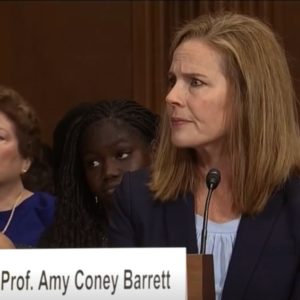Much has been said about how senators applied unconstitutional
But little has been said about the harm these displays of religious prejudice inflict on our
When a high-ranking official challenges a citizen’s ability to serve simply because of her religious identity, beliefs or affiliations, it demonstrates that anti-religious bigotry is acceptable. This should not be the case in America or anywhere.
And yet around the world religious minorities and those whose views don’t conform to prevailing orthodoxies face double standards when getting an education and applying for work.
These double standards don’t appear overnight, however. Attacks on religious freedom progress in four distinct stages:
— Social marginalization
— Economic Discrimination
— Legal (including criminal penalties
— Violence, either by vigilantes or the state
Religious discrimination can happen to any group anywhere. In Burma, long before there was genocide against Rohingya Muslims, they faced discrimination when applying for jobs and were subjected to abuse on social media. The Buddhist nationalist military and political elite demonized
In Muslim-majority Pakistan,
That’s not the case in the U.S.
Still, in recent years, the U.S. has seen the rapid spread of intolerance towards those who hold traditional religious beliefs, especially on life, sexual orientation and gender identity. While the U.S. still has robust legal prohibitions on religious discrimination, it has moved rapidly from the first stage of attack (social marginalization) to economic discrimination.
Not only is there widespread censorship of socially conservative
In one telling example at UC Berkeley, a Christian student leader was denounced with expletives and insults by classmates for three hours because she declined to support a resolution endorsing gender fluidity.
People in diverse fields have been threatened with losing their jobs because of their beliefs about sexual orientation and gender identity, including firefighters, pilots, teachers, entertainers, tech CEOs and T-shirt printers.
In Obergefell v. Hodges, Justice Anthony M. Kennedy characterized the original view of marriage as rooted in “decent and honorable” premises and pledged that the Court did not disparage the view or its supporters.
But only two years later, during Masterpiec
Seen in this light, the senators’ intense scrutiny of nominees’ beliefs are even more
Judge Barrett hasn’t been the only target.
Sen. Kamala Harris grilled another nominee about his membership in the Knights of Columbus, a Catholic service organization that espouses traditional marriage, suggesting that it made him unfit to be a judge. Sen. Sheldon Whitehouse asked still another nominee about his church’s position regarding the “God-given roles of father and mother.”
The message is clear: The “wrong” religious beliefs, activities and affiliations could jeopardize a nominee’s professional future.
In response, Sen. Mike Lee challenged his colleagues’ attempts to
Double standards strike at the heart of the American creed, the belief that all citizens are created equal and that the government may not establish any orthodoxy (religious or secular). The Founders included Article VI’s ban on religious tests in the Constitution because they knew the bitter sting of discrimination — those outside of the Church of England were banned from holding office by the 17th century Test Acts.
No one should be forced to choose between their faith and their livelihood. Religious freedom enables people of all creeds to flourish in education and in the workplace. This great and revolutionary idea made America truly pluralistic.
To ensure that America does not regress, citizens should call out economic discrimination on the basis of religion for what it is — before it becomes something worse.

